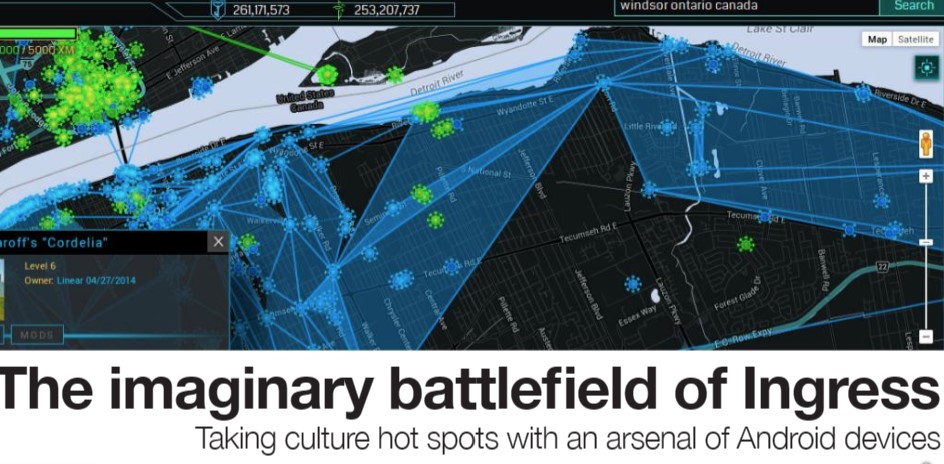The Urbanite – Jon Liedtke – July 2, 2014
Taking culture hot spots with an arsenal of Android devices
There’s a global war happening around us, all day, every day, being waged by two opposing factions the Enlightened and the Resistance and no one seems to notice.
Mysterious exotic matter has appeared across the globe and while nobody knows exactly what it is, members of the Enlightened believe that whoever deposited the exotic matter want to lift humanity towards enlightenment, and the resistance believes that they’re humanity’s last defence against an impending alien threat.
Battles are waged in public, at landmarks and attractions in cities across the globe, and both sides are actively fighting to establish portals on these landmarks to better their respective chances in battle.
Of course the fictional war is as engaging as you want it to be, and while the battle’s are being waged via smartphones, there’s a more meaningful purpose than what appears to just be a game: just beneath the surface, Google is improving the way we interact with the physical and digital world through Ingress, an augmented reality game for smartphones and tablets.
Anderson Lunau plays as the Resistance in Windsor. He’s met at least 30 Windsor residents – some of which have turned into friendships that he wouldn’t have if he had not been playing.
“Get off your couch and play a videogame,” is how Lanau describes Ingress. “[Google is] just literally trying to find out [about cities] and help people discover the world around them.”
Doug Sartori is a local app developer whose company, Parallel 42 Systems, recently launched the ExploreWE app to help urban residents explore their surroundings. He is impressed by Ingress and its potential.
“There’s so many different threads converging around Ingress,” said Sartori. “I was really impressed with [how] many different of Google’s goals they are accomplishing with one app and I expect we’ll see more apps like this in the future.”
Sartori identified data collection, the ability to influence Google Place Rank and developing a marketing tool as Google’s three main goals with Ingress.
“The tracking of the users as they move around their communities playing Ingress gives Google insight into how people move around on foot, and that includes a lot of the data that Google Maps aren’t great at (obtaining), like alleys and trails,” he said.
Much like Google Pagerank for the internet, Google Place Rank is the way Google determines which physical places are popular and should appear higher on local search results.
“Finding out what local landmarks attract foot traffic is an important goal for Google as well.”
Sartori studied Ingress’ Terms of Service and found it was bound to Google’s privacy policy, which means the company aggregates data from all users playing the game and then uses that data for their own purposes.
Lunau understands that Google is using the data generated through the game for their own purposes and he is okay with the data collection.
“A lot of people are very afraid, there’s a culture in North American society that everybody is watching what you do and everybody is concerned about privacy, but I don’t think that we can really control it in the end of the day, because we’re the ones using the devices,” he said.
“So Google’s gonna use that too when I have Google Now on and it says I’m 11 minutes from home and there’s traffic on the way, and it actually helps me. I don’t see the downside of that because they’re going to get the data regardless, and I would like to think that they would at least use it for a healthy positive purpose.”
This kind of data collection raises legal questions for Sartori, namely regarding the kind of legal controls that should and can be put on this type of big data collection.
“I think we need to raise public awareness about how this data is used and have a good public debate about how data should be used. before we’re going to be able to build the political will to get some kind of rules. Right now, it’s really the wild west.”
Sartori explained that “big data” and the ability to “aggregate massive amounts of data is going to enable research and provide a deeper understanding of human behaviour and the world around us than we’ve ever been able to accumulate before.”
JON LIEDTKE – JULY 2 2014
PAGE 5

Jonathon Liedtke is the managing editor of The Urbanite, Windsor’s alternative newspaper. He is also a member of Windsor’s “Punk with Horns” band The Nefidovs, and as such, is committed to enhancing and sustaining the arts community.



Leave a Reply